★★
“The Middle Ages – sanitized, for your protection.”
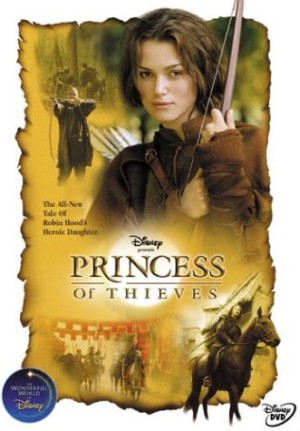 Back before Pirates of the Caribbean made Knightley a household name, and even before Bend It Like Beckham made her an obscure name, as a fifteen-year old she shot this Disney TVM, which rewrites history wholesale from the very start. It begins in 1184, claiming this is the reign of Richard the Lionheart – this must come as a surprise to Henry II, since he didn’t die until 1189. It also introduces Philip, Richard’s supposed illegitimate son, out to replace the evil King John; in reality, Philip may not have existed and certainly left no mark on history. However, the film needs a romantic lead, so there you go. Of course, the whole Robin Hood mythology is more a block of clay, that writers and film-makers have seen fit to mould as they wish.
Back before Pirates of the Caribbean made Knightley a household name, and even before Bend It Like Beckham made her an obscure name, as a fifteen-year old she shot this Disney TVM, which rewrites history wholesale from the very start. It begins in 1184, claiming this is the reign of Richard the Lionheart – this must come as a surprise to Henry II, since he didn’t die until 1189. It also introduces Philip, Richard’s supposed illegitimate son, out to replace the evil King John; in reality, Philip may not have existed and certainly left no mark on history. However, the film needs a romantic lead, so there you go. Of course, the whole Robin Hood mythology is more a block of clay, that writers and film-makers have seen fit to mould as they wish.
Here, when Robin is arrested trying to link up with Philip (Moyer), it’s his daughter, Gwyn (Knightley), who puts together her own band of merry men, with the aim of both rescuing her father and putting Philip in his rightful place on the throne. Archery contests and the Sheriff of Nottingham (McDowell) ensue, until Philip, under an assumed name, joins her posse, and the inevitable romantic attraction begins. This is much to the chagrin of Froderick (Synnott), Gwyn’s longtime companion from when she grew up in a monastery [her dad being off crusading with Dick]. However, since he has a crap haircut, it’s clear Frodork doesn’t have a chance with the perfectly-complexioned Gywn and her immaculate teeth.
It is largely bland, unthreatening and unsatisfying, yet not entirely unwatchable. Knightley – only 15 when she made it – clearly has star potential, and her archery experience must have come in handy for her later role in King Arthur. Early on, there is an almost Mulan-like feel, with Gwyn defying her father and dressing as a boy. However, the more the film proceeds, the more she is shuffled off to the side in favor of Philip, who is much less interesting a character, especially from this site’s point of view. McDowell is as reliably evil as ever, while Jonathan Hyde does his best Alan Rickman impression as King John, yet, inevitably, comes off as a poor imitation. If this isn’t worth paying money for, as a Saturday afternoon diversion on TV, it’s tolerable.
Dir: Peter Hewitt
Star: Keira Knightley, Stephen Moyer, Malcolm McDowell, Del Synnott





 Nita Daniels (Wagner) and her three girlfriends take a horseback trip up the mountain, expecting to meet their husbands at the top. However, the trip becomes a nightmare, as four members of the ‘Aryan Survivalist Brigade’ are holed up there, and decide to take out the women and their alcoholic guide, Ding (Skerritt). Initially, Ding takes the fore, but when he is injured it’s up to Nita and her pals to fight back. This TVM struggles, largely because of the lack of justification for the white supremacists: the entire party they attack are about as Aryan as they come, so why, exactly, should they be targeted for elimination? It would have been far more plausible had the party been ethnically-mixed, or even their guide been black – or, heck, Jewish.
Nita Daniels (Wagner) and her three girlfriends take a horseback trip up the mountain, expecting to meet their husbands at the top. However, the trip becomes a nightmare, as four members of the ‘Aryan Survivalist Brigade’ are holed up there, and decide to take out the women and their alcoholic guide, Ding (Skerritt). Initially, Ding takes the fore, but when he is injured it’s up to Nita and her pals to fight back. This TVM struggles, largely because of the lack of justification for the white supremacists: the entire party they attack are about as Aryan as they come, so why, exactly, should they be targeted for elimination? It would have been far more plausible had the party been ethnically-mixed, or even their guide been black – or, heck, Jewish. It’s kinda sad to say, but the action in this Disney TV movie kicks the ass of, not only most TV shows, but a credible number of Hollywood films. Then again, behind the fights here is Koichi Sakamoto, who is also responsible for Drive, among the best American martial-arts films of all time. And while obviously “Disneyfied”, this is still sprightly and engaging, with a couple of very decent fight sequences. It is, however,
It’s kinda sad to say, but the action in this Disney TV movie kicks the ass of, not only most TV shows, but a credible number of Hollywood films. Then again, behind the fights here is Koichi Sakamoto, who is also responsible for Drive, among the best American martial-arts films of all time. And while obviously “Disneyfied”, this is still sprightly and engaging, with a couple of very decent fight sequences. It is, however, 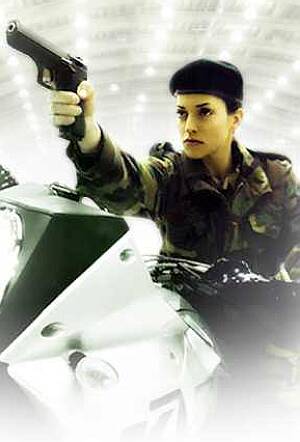 This SciFi Channel original movie is based on a comic-book series, but makes some radical changes to the storyline, though the basic idea is intact: a woman becomes immune to injury after the usual mysterious something happens to her [radioactive spider bite, barrel of toxic waste – the usual graphic novel contrivances, in other words]. In the comic, she was an undercover cop; here, she is a Special Forces soldier in Chechnya who is exposed to an experimental biological agent. Naturally, she subsequently finds herself much sought after, by both good and bad factions, since she’s the first to survive the treatment.
This SciFi Channel original movie is based on a comic-book series, but makes some radical changes to the storyline, though the basic idea is intact: a woman becomes immune to injury after the usual mysterious something happens to her [radioactive spider bite, barrel of toxic waste – the usual graphic novel contrivances, in other words]. In the comic, she was an undercover cop; here, she is a Special Forces soldier in Chechnya who is exposed to an experimental biological agent. Naturally, she subsequently finds herself much sought after, by both good and bad factions, since she’s the first to survive the treatment.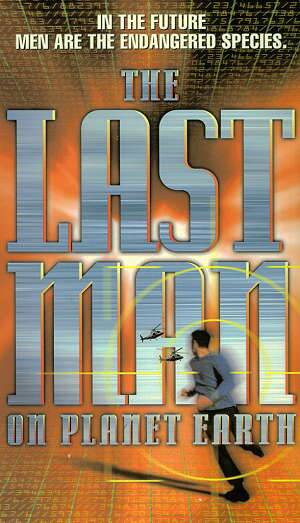 You’ve got to admire any film – particularly a TV movie – that provokes diverse reviews. This, then, not only “
You’ve got to admire any film – particularly a TV movie – that provokes diverse reviews. This, then, not only “ Do
Do 
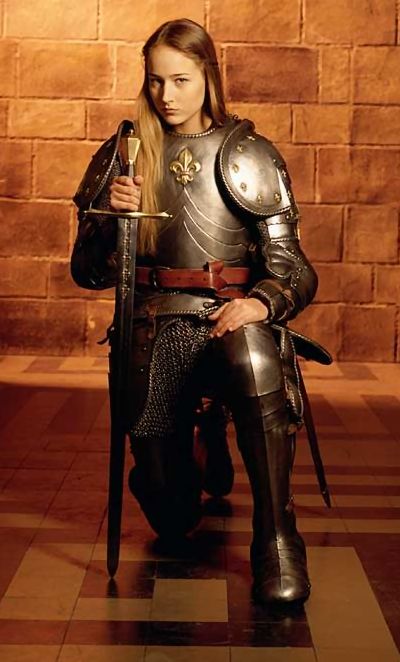
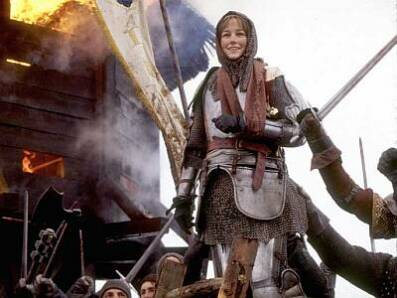 However, the main difference between this and The Messenger is that Joan of Arc is convincing. Perhaps with the advantage of having extra time (the DVD of the miniseries runs 189 minutes), they make the effort to show her interacting with other characters, and Sobieski’s calm, complete assurance is a striking contrast to Jovovich. The viewer can see why people would believe her, and it naturally follows they will too – Sobieski’s Emmy nomination was entirely well-deserved. Despite playing fast and loose with the facts (another example: Joan’s brother was not killed in battle, but lived to see her trial verdict overturned), this strong central performance holds the film together and, with the aid of the other fine actors, makes it eminently watchable. It may not be historically accurate, but it does a fine job of explaining why her myth is still honoured in the third millennium, without coming down in one camp or the other regarding the source of her visions. There are few TV miniseries worth watching, and fewer still worth owning, but this one comes highly recommended.
However, the main difference between this and The Messenger is that Joan of Arc is convincing. Perhaps with the advantage of having extra time (the DVD of the miniseries runs 189 minutes), they make the effort to show her interacting with other characters, and Sobieski’s calm, complete assurance is a striking contrast to Jovovich. The viewer can see why people would believe her, and it naturally follows they will too – Sobieski’s Emmy nomination was entirely well-deserved. Despite playing fast and loose with the facts (another example: Joan’s brother was not killed in battle, but lived to see her trial verdict overturned), this strong central performance holds the film together and, with the aid of the other fine actors, makes it eminently watchable. It may not be historically accurate, but it does a fine job of explaining why her myth is still honoured in the third millennium, without coming down in one camp or the other regarding the source of her visions. There are few TV miniseries worth watching, and fewer still worth owning, but this one comes highly recommended.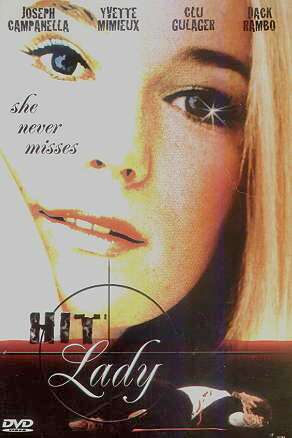 Things the movies teach us, #285: if you are a criminal, do not agree to do “one last job” before retiring, because it never works out that way. I guess assassin for hire Mimieux doesn’t go to the cinema enough, or she’d have known this, rather than letting herself get talked into that OLJ, in this case, killing a union leader. To make it look like an accident, she has to get close to him, only to find herself falling in love with her target – a common hazard of the job, going by how often this happens in films. From here, it’s all downhill, as her identity is compromised, and she has to flee.
Things the movies teach us, #285: if you are a criminal, do not agree to do “one last job” before retiring, because it never works out that way. I guess assassin for hire Mimieux doesn’t go to the cinema enough, or she’d have known this, rather than letting herself get talked into that OLJ, in this case, killing a union leader. To make it look like an accident, she has to get close to him, only to find herself falling in love with her target – a common hazard of the job, going by how often this happens in films. From here, it’s all downhill, as her identity is compromised, and she has to flee.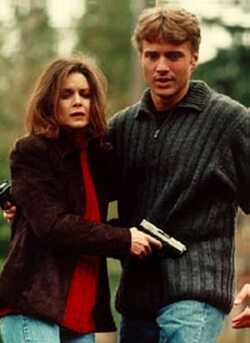 The imagination on view is exemplified by the title; changing a definite article is about as imaginative as it gets in this TV movie. Kapture, a veteran of Silk Stalkings, plays Jenny Farrell, the security officer at a pharmaceutical company who has to guard the only witness to a robbery, a deaf man (Natale) whom the villains want dead. Oh, and they’ve got inside help.
The imagination on view is exemplified by the title; changing a definite article is about as imaginative as it gets in this TV movie. Kapture, a veteran of Silk Stalkings, plays Jenny Farrell, the security officer at a pharmaceutical company who has to guard the only witness to a robbery, a deaf man (Natale) whom the villains want dead. Oh, and they’ve got inside help.